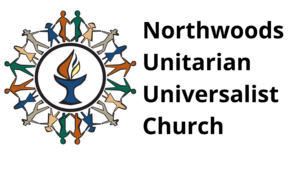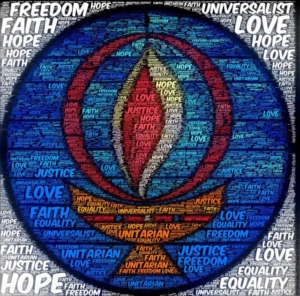What We Believe
Unitarian Universalism is a non-creedal religion that both embraces and transcends its roots, encompassing a wide variety of personal theological and religious beliefs, while also holding in common a commitment to living our Eight Principles in practical, transformative ways in the world. Unitarian Universalists value religious freedom and tolerance, full equality of all people, diversity, spiritual life and learning, care and respect for our planet, and working together to make the world a better place for all people.
8 Principles
1st Principle: The inherent worth and dignity of every person
2nd Principle: Justice, equity and compassion in human relations;
3rd Principle: Acceptance of one another and encouragement to spiritual growth in our congregations;
4th Principle: A free and responsible search for truth and meaning;
5th Principle: The right of conscience and the use of the democratic process within our congregations and in society at large;
6th Principle: The goal of world community with peace, liberty, and justice for all;
7th Principle: Respect for the interdependent web of all existence of which we are a part.
8th Principle: We covenant to affirm and promote: journeying toward spiritual wholeness by working to build a diverse multicultural Beloved Community by our actions that accountably dismantle racism and other oppressions in ourselves and our institutions.
Sources of our Principles
Unitarian Universalist congregations affirm and promote seven Principles, which we hold as strong values and moral guides. We live out these Principles within a “living tradition” of wisdom and spirituality, drawn from sources as diverse as science, poetry, scripture, and personal experience. These are the six sources our congregations affirm and promote:
- Direct experience of that transcending mystery and wonder, affirmed in all cultures, which moves us to a renewal of the spirit and an openness to the forces which create and uphold life;
- Words and deeds of prophetic people which challenge us to confront powers and structures of evil with justice, compassion, and the transforming power of love;
- Wisdom from the world’s religions which inspires us in our ethical and spiritual life;
Jewish and Christian teachings which call us to respond to God’s love by loving our neighbors as ourselves; - Humanist teachings which counsel us to heed the guidance of reason and the results of science, and warn us against idolatries of the mind and spirit;
- Spiritual teachings of Earth-centered traditions which celebrate the sacred circle of life and instruct us to live in harmony with the rhythms of nature.
Rev. Kathleen Rolenz said, “Throughout history, we have moved to the rhythms of mystery and wonder, prophecy, wisdom, teachings from ancient and modern sources, and nature herself.”
(www.uua.org)

